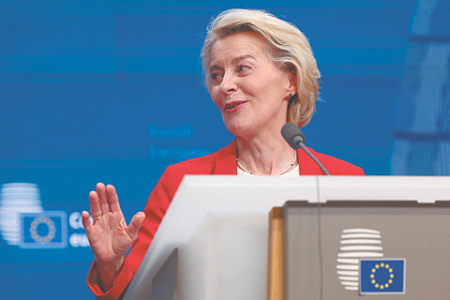
European Commission President Ursula von der Leyen has decisively overcome a no-confidence motion in the European Parliament, an attack spearheaded by far-right and nationalist factions that sought to unseat her. The attempt was soundly defeated as mainstream political groups consolidated their support for the Commission’s leadership, reaffirming von der Leyen’s position amid a charged political atmosphere.
The challenge was rooted in the long-running controversy dubbed ‘Pfizergate,’ concerning a massive €35 billion COVID-19 vaccine procurement deal between the EU and Pfizer. The motion, initiated by Romanian MEP Gheorghe Piperea, did not focus on corruption but accused von der Leyen of deliberately overstepping her authority. Critics argue she centralized decision-making power that should have belonged to member states, a claim fueled by the Commission’s later statement that personal text messages between von der Leyen and Pfizer’s CEO concerning the deal had not been preserved.
Piperea, a member of the far-right Alliance for the Union of Romanians, successfully rallied support from a coalition of nationalist and euroskeptic groups, including the European Conservatives and Reformists, Patriots for Europe, and Europe of Sovereign Nations. The motion also received vocal backing from Hungarian Prime Minister Viktor Orbán, highlighting a broader pushback against what they perceive as federalist overreach from Brussels.
Despite the pressure, von der Leyen’s allies remained steadfast. The president herself was notably absent from the vote, attending a conference on Ukraine in Rome, signaling confidence in the outcome. In a fiery parliamentary debate, Manfred Weber, leader of von der Leyen’s center-right European People’s Party (EPP), accused the motion’s organizers of being ‘Putin’s friends’ attempting to destabilize the EU. The final vote saw the motion fail with 360 MEPs against, 175 in favor, and 18 abstentions.
Although the immediate threat has been neutralized, the episode underscores the deepening ideological rifts within the European Union. Piperea has already vowed to make another attempt to oust the Commission president. The incident reflects a persistent and growing tension over the Commission’s expanding role as the EU consolidates into a more integrated political and security union. Von der Leyen continues to navigate a treacherous political landscape, facing criticism from all sides and highlighting the fundamental struggle over the future direction and balance of power within Europe.
